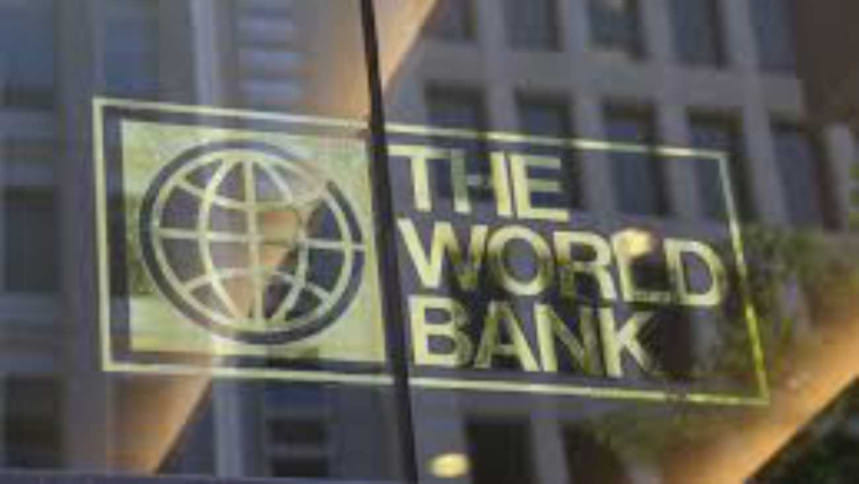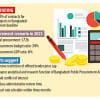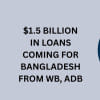Economy to remain under stress

The World Bank has revised down its growth forecast for fiscal 2023-24 to 5.6 percent as the Bangladesh economy is expected to remain stressed throughout the year thanks to persistent inflationary pressures and external sector challenges.
Earlier in January, the Washington-based multilateral lender forecasted a 6.2 percent GDP growth for this fiscal year and reaffirmed the forecast in April.
The government has targeted GDP growth of 7.5 percent for this fiscal year.
"There are significant downside risks," the World Bank said in its report styled "Bangladesh Development Update -- New Frontiers in Poverty Reduction", which was unveiled yesterday.
One of the risks is inflation, which accelerated as a result of external and domestic factors.
External factors include supply chain disruptions following Russia's invasion of Ukraine and higher international commodity prices, the report said.
Domestic factors include a 16 percent depreciation of the taka against the dollar in fiscal 2022-23 and persistent foreign currency shortages that have led to import restrictions.
A 179 percent increase in the administered gas for the industrial sector, coupled with an increase in administered electricity prices led to higher prices for manufactured products.
Higher administered diesel prices affected irrigation and the prices of agricultural products.
A more than 40 percent increase in the administered prices of petroleum products in the domestic market impacted transportation costs, which, in turn, affected retail prices.
High administered energy prices and their spillover effects on other sectors, the continued depreciation of the taka, continued restrictions on imports, insufficient dollars in the banks and sluggish monetary tightening are expected to keep inflation at an elevated level this fiscal year, too.
Subsequently, the World Bank forecasted inflation to average 8.5 percent this fiscal year, which is much higher than the government target of 6 percent.
In the first three months of the fiscal year, inflation averaged 9.75 percent, according to data from the Bangladesh Bureau of Statistics.
"Both the monetary and fiscal policy need to address inflation," the WB said in the report.
High inflation may persist longer than expected if domestic energy prices are not adjusted in line with the global slowdown in energy prices.
Domestic financing of the deficit was heavily monetised last year, "which is incompatible with the objective of reducing inflation".
"The retreat from such a stance through the first quarter of fiscal 2023-24 is a welcome change that needs to be sustained."
Bangladesh faces a significant policy trade-off between inflation and growth, and it may be necessary to risk some reduction in growth through contractionary monetary and fiscal policies to bring inflation closer to the target, the WB said.
In the first quarter of the fiscal year, the government did not borrow from the central bank; rather, it refunded a portion of its loans, according to data from the central bank.
Improved transmission of monetary policy through the relaxation of interest rate caps, easing of foreign exchange shortage through exchange rate flexibility and the consequent normalisation of imports are likely to help ease inflationary pressure gradually in the medium term, the WB said.
Until inflation recedes to the target, monetary policy needs to be contractionary.
Monetary policy transmission would be improved by greater interest rate flexibility and reduced use of non-market national savings certificate instruments for government borrowing, it said.
The WB report touched on another major pressure point of the Bangladesh economy: depleting foreign currency reserves, due to the diversion of remittance to informal channels thanks to a wide exchange rate premium.
The official exchange rate is capped at Tk 110 for buying dollars and Tk 110.5 for selling dollars. In the kerb market, the exchange rate is Tk 118-120.
"Forcing the market to trade at an exchange rate significantly different from the market clearing rate may only support the further use of the informal foreign exchange markets such as the kerb and hundi markets," the WB said.
A large fraction of the remittances could continue to flow through informal channels if the informal exchange rate premium is not reduced through greater exchange rate flexibility.
"A market-determined exchange rate is critical to attract more remittance through the formal channel, reduce the difference between export shipment and export receipts, and make illegal capital outflows less attractive."
This would support balance of payment and reserve accumulation and restore market confidence, the WB said.
Meanwhile, the WB revised down the growth projections for the Maldives, Nepal and Pakistan for this fiscal year too.
It revised upwards the growth projections for Sri Lanka and Bhutan and maintained the same forecast of 6.3 percent for India.

 For all latest news, follow The Daily Star's Google News channel.
For all latest news, follow The Daily Star's Google News channel. 








Comments